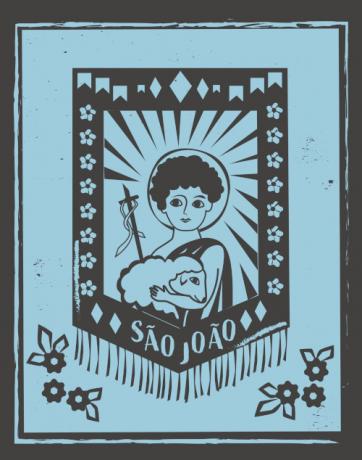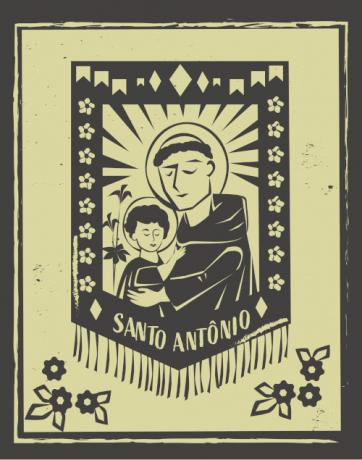It is known that at June parties are held in Brazil since the time colonial and their main motivating factor is the celebration of the days of four main saints of the Catholic Church:
St. Anthony of Padua,
Saint John the Baptist,
Saint Peter and
Sao Paulo.
THE devotion and celebrations devoted to these saints have produced over time a series of sympathies, that is, superstitious rituals, typical of popular Catholicism.
Below we list five of these sympathies, three related to São João and two related to Santo Antônio.
Read too: 10 must-have items at a June party
5 sympathies of June parties
1. walk on the embers of the fire

St. John the Baptist is the most prestigious saint on June festivities. Much of the symbols that are attached to them, such as the bonfire, derive from devotion to this saint. THE Saint John's festival is held on the night of June 23 (the eve of its day, 24) and, when it comes to the bonfire, there is a very common and old sympathy in Brazil, which consists of walk over the embers of the fire with bare feet.
This practice is carried out by both Catholic priests and lay people. The last ones do it mainly because of some promise to be paid or something like that.
It is interesting, however, to know that this sympathy dates back to an ancient cult of the Roman goddess Feronia, as Câmara Cascudo says|1|:
“In Italy, in the sanctuary of the goddess Feronia at the foot of Monte Soracte, every year the men of certain families walked with their feet bare and without burning on the embers and the ashes of a great bonfire made of pine trees, in the presence of countless crowds from all over the region to make their devotions to the goddess. The families to which these men belonged were named after Hirpi Sorani, the Wolves of Soranus.”
The rite dedicated to the goddess ended up being assimilated by Christianity and survived, transformed, in the form of sympathy.
2. ring sympathy
Still following the folklorist Câmara Cascudo, there is another sympathy for the night of St. John's Eve, now related to the theme of guessing the person you're going to marry. Says Cascudo|1| what:
“On Saint John's night, a glass containing water is passed over the fire, a wedding ring attached by a thread is placed in the glass without reaching the water, and the thread is held; as many knocks are given to the ring on the glass walls as the years that the experimenter will have to wait for the wedding.”
This sympathy too derives from ancient oracle rituals of ancient civilizations, which availed themselves of the belief that the action of fire passed on to certain objects some power to unravel the future. This type of belief has also survived time, taking on another meaning associated with the devotion of St. John.

3. egg sympathy
Still associated with the bonfire, we have one more sympathy for guess what kind of husband you will have. Also collected by Câmara Cascudo|1|, this sympathy says that:
“The girls passed over the embers cups full of water, inside which they broke eggs, and went to expose them to the serene: in the morning they would examine them: and according to the positions taken by the white and the yolk, forming more or less approximately a church, a ship, a jewel, would mean: marriage, voyage, wealth, and so on. against".
Like the previous sympathy, this egg sympathy is centered on the incantatory power of fire and also refers to ancient rites of classical European civilizations.
See too: What are the typical foods of June festivals?
4. Punish the saint to find a bridegroom

Now, when it comes to sympathy to find a husband or to tie a husband, the favorite saint in popular traditions is HolyAntonio. St. Anthony of Padua was a saint medieval born in Lisbon, but who spent most of his life in Padua, Italy. As a saint whose devotion is closely linked to family relationships, over time, he ended up becoming popularly the “holy matchmaker”.
The researcher Lúcia Helena Rangel, in her book June parties|2|, presents some typical sympathies of the interior of Brazil that have Santo Antônio as the protagonist. One of these sympathies is done as follows:
“Single girls, eager to get married, in various regions of Brazil, put him upside down behind the door or inside the well or bury him up to his neck. They make the request and, while they are not answered, there is the image upside down.”
This rite of “punishing the saints” is a resignification of punishments to idols practiced by various European civilizations, who beat or whipped statues of their gods in order to receive some benefit in return. In the case of the “punishment” of Santo Antônio, there was also the accompaniment of songs like the one below:
My dear St. Anthony,
my flesh and blood saint,
if you don't give me a husband,
I don't pull you out of the well.
The corn harvested late
it does not yield straw or ear.
my grandmother has at home
an old St. Anthony.
in the boys not wanting me
I hit the saint
5. Prayer to "hold" the groom and "tie" the husband
Finally, we have a popular prayer that is made by the girl who is engaged but wants rush the wedding or even the newlywed wife who don't want to lose the spouse. Such prayer brings symbolic elements that are transformed into resources to "captivate", "approach" the man in question, as can be seen below|2|:
“Father St. Anthony of the captives, you who are a sure binding, bind, for your love, whoever wants to flee from me, bind your habit and your holy cord with strong handcuffs and hard fetters that prevent the steps of (beloved's name), who wants to flee from me, and make, oh my blessed Saint Anthony, that he marry me without delay! By your miracles; by the word when you speak to Jesus; for your father's defense, here is a request I shall make.”
As seen, these two saints have many tasks to attend to during the June festivals.
Grades
|1| CASCUDO, Luís da Câmara. Superstitions in Brazil. Belo Horizonte: Ed. Itatiaia; São Paulo: Ed, USP, 1985.
|2| RANGEL, Lucia Helena Vitalli. June festivities, São João festivities: origins, traditions and history. São Paulo: Publishing Solutions, 2008.
By Me. Cláudio Fernandes
Source: Brazil School - https://brasilescola.uol.com.br/detalhes-festa-junina/cinco-simpatias-festas-juninas.htm
